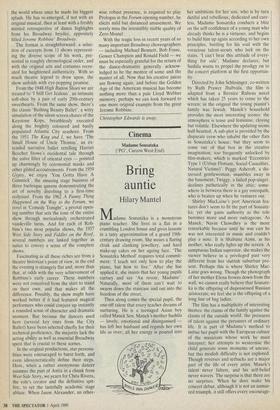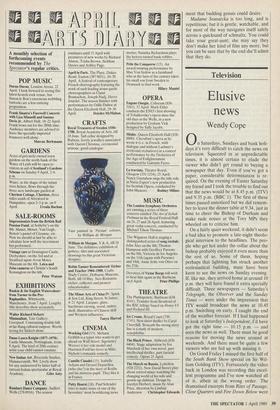Cinema
Madame Sousatzka ('PG', Curzon West End)
Bring auntie
Hilary Mantel
Madame Sousatzka is a monstrous piano teacher. She lives in a flat in a crumbling London house and gives lessons in a tatty approximation of a grand 19th- century drawing room. She wears a flaring cloak and clanking jewellery, and hard make-up cakes on her ageing face. 'The Sousatzka Method' requires total commit- ment: 'I teach not only how to play the piano, but how to live.' After she has applied it, she insists that her young pupils curtsey and say 'Au revoir, Madame'. Naturally, most of them can't wait to swarm down the staircase and out into the freedom of the street.
Then along comes the special pupil, the one-off talent that every teacher dreams of nurturing. He is a teenaged Asian boy called Manek Sen. Manek's mother Sushila — lovely, emotional and disorganised has left her husband and regards her own life as over; all her energy is poured into her ambitions for her son, who is by turn dutiful and rebellious, dedicated and care- less. Madame Sousatzka conducts a blitz on the self-confidence of a young man who already thinks he is a virtuoso, and begins to build him up again according to her own principles, battling for his soul with the voracious talent-scouts who lurk on the stairs. 'I can't bear this attitude of every- thing for sale', Madame declares; but Sushila wants to propel the prodigy on to the concert platform at the first opportun- ity.
Directed by John Schlesinger, co-written by Ruth Prawer Jhabvala, the film is adapted from a Bernice Rubens novel which has taken 25 years to come to the screen; in the original the young pianist's family was Jewish. Manek's household provides the most interesting scenes: the atmosphere is tense and feminine, cloying but volatile. Elsewhere the updating seems half-hearted. A sub-plot is provided by the disparate crew who inhabit the other flats in Sousatzka's house; but they seem to come out of that box in the creative imagination, too frequently unlocked by film-makers, which is marked 'Eccentrics Type 1 (Urban Flotsam, Social Casualties, Natural Victims)'. Peggy Ashcroft, a dis- tressed gentlewoman, mumbles away in the basement; Twiggy, a failed pop-singer, declines pathetically in the attic; some- where in between there is a gay osteopath, who is beaten up when he ventures out.
Shirley MacLaine's pert American fea- tures don't seem to fit the part of Sousatz- ka, yet she gains authority as the role becomes more and more outrageous. As Manek, Navin Chowdhry is the more remarkable because until he was cast he was not interested in music and couldn't play a note. It is Shabana Azmi, as his mother, who really lights up the screen. A sumptuous Indian superstar, she makes the viewer believe in a privileged past very different from her sluttish suburban pre- sent. Perhaps this is where Shirley Mac- Laine goes wrong. Though the photograph of her mother Elena frowns down from the wall, we cannot really believe that Sousatz- ka is the offspring of dispossessed Russian aristocrats; we feel she is the offspring of a long line of bag ladies.
The film has a multiplicity of interesting themes: the claims of the family against the claims of the outside world, the pressures of talent against the pressures of ordinary life. It is part of Madame's method to imbue her pupil with the European culture of the musicians whose work he must interpret; her attempts to westernise the child generate some moments of unease, but this modish difficulty is not explored. Though reverses and setbacks are a major part of the life of every artist, Manek's talent never falters, and his self-belief never wavers. The surprise is that there are no surprises. When he does make his concert debut, although it is not an unmar- red triumph, it still offers every encourage- ment that budding genuis could desire.
Madame Sousatzka is too long, and is repetitious; but it is gentle, watchable, and for most of the way navigates itself safely across a quicksand of schmaltz. You could take your great-aunt; she may say they don't make her kind of film any more, but you can be sure that by the end she'll admit that they do.



















































 Previous page
Previous page